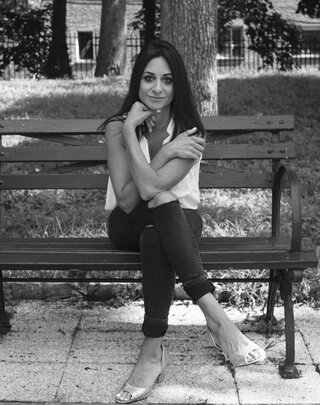
Emily James
Contest - 1,000 Words or Less - Creative Nonfiction
Emily James is a former high school teacher and writer in NYC. She is the submissions editor at Pidgeonholes and the CNF Editor at Porcupine lit. She’s a Smokelong Flash 2020 Finalist, and the winner of the 2019 Bechtel Prize. Her work can be found in Guernica, River Teeth, The Atticus Review, Jellyfish Review, and elsewhere.
The Reckoning
I'm a teacher, you say.
She’ll ask: What are they like?
Like you could describe them, like they are in a museum, or a main dish on a restaurant menu.
They’re cool, you reply. And you don’t say more.
Because some days, they ask to talk to you alone real quick outside the classroom, so you squeeze past their classmates’ chairs, step into the hallway where it smells like rotted boxed milk. They hold a crumpled five-dollar bill and whisper like a dark secret: Do you have change for this? I want some Cheez-Its from the machine.
Some days, they spray their long hair down with Japanese cherry blossom, shoop shoop shoop, walk into it, turn in a circle.
Some days they become items on your list.
Exterminator
Pay Pre-K Bill
Amani
Isabella
Rug Return
John
And the days they aren’t, they make it to the top anyways, without inscription, without lead on paper, just standing in front of you with their new fleece sweater and their stark white shoes.
Some days, their tears drip into the ink on their journal pages.
Some days, they come in late, smiling, carry birthday balloons and tie them to the backs of their desk chairs with big curly ribbons, eyelashes like butterfly legs.
Some days, you hand them the Visine, tell them, He’s not good for you, I don’t care if he buys you egg and cheese every morning from Green Grass, this is the last time.
Some days, you tell them about babies, how they ruin everything. How they unbalance the world and make every woman find something to hate about the man they used to love.
Some days, the sight of their youth—the round of their hips and precision of their skin—it hunches your shoulders, wrinkles your knees. They’re dandelions, and you become the dead white wisps, waiting for the wind to blow you away.
Some days, they pull the articles up on their phone screens. Their nails are pointy and pink with white rose rhinestones, and they click the screens as they scroll. Their father's bike accident on Metropolitan. Their nephew’s house fire. Their brother’s murder where they found him rolled up in a carpet in Bed Stuy. You scroll with your thumb and try to think of words, but your jaw just sort of clutches teeth and distance swirls inside your gut and you say nothing.
Most days, you hug them, even though you’re not supposed to. They are bones beneath your wrists or full fists of flab between your fingers. You cup your hands around their chins and watch their faces squint into smiles above their scarves, braces gleaming, rubber bands tight.
Some days, their questions give you life:
Miss, why don’t you comb your hair?
Miss, why don’t white people use wash cloths?
Miss, when you gonna get your toes done?
Miss, how do you know if you have the Big O?
Miss, did your butt get thick?
Some days, you want to ask them: Did my butt get thick?
What are they like? she asked you. You don’t bother explaining, but some days you look to them and the wonders come like waterfalls: Where will they be standing and what will they be wearing and who will they become? The futures you have mixed for them swirl themselves to color. You see them in their scrubs or in their dorm room with their AirPods on and a candle burning or in the chairs besides a person they love who is dead in a box. Most times you don’t worry, because most days their hearts feel like steel and you long for that strength, that posture and certainty, something that comes from growing up on a side of the world where you can see more. Disparities aren’t something imagined but dealt with and inhaled and released before a foot moves on, forward. Next step. Go. Some days, they ask things like: How are white people so absentmindedly racist? And you tell them: Because we are all so flawed and afraid to see it, terrified we’ve done something wrong.
You’ll lean in closer and whisper: We can’t even see that our feet are planted on the backs of others, instead of the ground.
And they nod and you nod and they ask, What are y’all—blind?
Yes, I guess that’s it, you tell them. And you know they see it. But you see what you want.
Well, time needs to be up! They tell you. It’s about that time!
The Reckoning! you yell. Times up!
Miss, you gotta tell them!
I’m gonna tell them! you scream, and you share a bag of Cool Ranch Doritos and put on a song and read from your Fences books and laugh, a chorus of ha ha ha’s, knowing that time has been up forever, and hoping you'll have the strength to keep your word.
“ ‘The Reckoning’ is a story I wrote in response to the tedious and minimizing question I used to get asked all the time by outsiders about my students: What are they like? Or even worse, the people who didn’t ask, and assumed they knew. My kids pushed me to look inside and grow, to reckon with the depth of some of my flaws. The essay is an attempt to capture the way the different multitudes of my students’ energy and lives sustained mine, could sustain and save anyone who was lucky enough to know them.
*Identifying details of incidents have been changed in order to protect student privacy. ”
